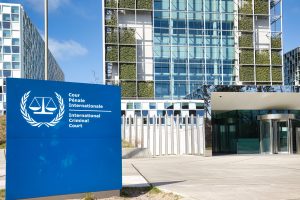Last month, Karim Khan, the chief prosecutor of the International Criminal Court (ICC), announced that he was officially seeking an arrest warrant for Myanmar junta leader Senior Gen. Min Aung Hlaing for crimes against humanity against the Rohingya back in 2017. This move is truly historic. It is the first time that an arrest warrant has ever been sought for any individual from Myanmar or anyone involved in the Rohingya genocide.
To build on this landmark action, ICC member states should now refer the broader situation in Myanmar to the ICC chief prosecutor, especially because of the many mass atrocity crimes committed since Min Aung Hlaing’s disastrous coup in 2021, which are not covered by the current investigation.
Member states can make such a referral by employing Article 14 of the ICC statute. Article 14 empowers ICC member states to refer a situation to the chief prosecutor in which one or more of the crimes coming under the court’s jurisdiction – war crimes, crimes against humanity, and genocide – are occurring. The referral itself is a straightforward diplomatic letter to the chief prosecutor with supporting documentation.
This option is neither politically nor legally contentious (41 ICC member states have already done it in Ukraine), and states have actually had the option to refer the situation in Myanmar to the chief prosecutor since July 17, 2021, when Myanmar’s legitimate civilian government lodged a declaration with the court’s registrar willfully accepting the ICC’s jurisdiction. Since then, my colleagues and I have urged various ICC member states to take up this option for Myanmar. Too often, we’ve unfortunately been met with hand-wringing and hesitation.
A particular sticking point in our discussions with ICC member states seems to be the status of Myanmar’s civilian government, the National Unity Government (NUG), and the validity of its declaration to the ICC. However, that is not a decision in the hands of the member states. Jurisdictional issues, such as the validity of the NUG’s declaration, are decided by the court, not member states, and not the chief prosecutor. Moreover, in situations where there is a reasonable argument in favor of jurisdiction, such as in Myanmar, according to the court itself, the prosecutor should open an investigation.
While justice for the Rohingya genocide is essential, without equal access to justice for all of Myanmar’s many ethnic communities, the cycle of impunity will likely continue. Moreover, without a more comprehensive approach to the crimes taking place in Myanmar, the ICC’s move risks being maliciously used by Min Aung Hlaing’s junta to stoke nationalistic hatred against the Rohingya further.
Since the day of the Myanmar military’s disastrous putsch, my organization Fortify Rights and others have been documenting war crimes and crimes against humanity committed by the junta against various communities in Myanmar, including, but not only, the Rohingya. Given that the ICC’s current investigation only focuses on the crimes committed against the Rohingya during the second half of 2017, and occurring at least in part on Bangladeshi territory, none of the junta’s crimes since the coup will be considered, and multiple perpetrators will continue to enjoy deep impunity.
Over the past year alone, the Myanmar military junta, having suffered heavy battlefield losses, has increasingly resorted to airstrikes and artillery attacks, directly targeting civilians far removed from any legitimate military targets. In just the past six months, Fortify Rights has documented deadly air strikes on camps for the internally displaced, schools, hospitals, and places of religious worship.
Alongside these depraved and unlawful attacks, the junta continues to lock up its real and perceived opponents in vast numbers, constituting imprisonment as a crime against humanity. According to the Assistance Association for Political Prisoners, since the coup, the junta has systematically arrested more than 27,000 men, women, and children, and continues to detain some 21,000 of them. The U.N. reports that at least 1,853 detainees have died in custody since the coup, many summarily executed or tortured to death, in addition to several thousand other civilians killed around the country.
For their part, Myanmar’s pro-democracy revolutionary forces have also committed war crimes, including an August massacre of Rohingya civilians in Rakhine State committed by the Arakan Army. In the same part of the country, the situation is further complicated by the widespread forced recruitment of Rohingya refugees by Rohingya armed groups, who have recently become allied with the same Myanmar military responsible for genocide against them.
Needless to say, a broader ICC investigation could and should encompass crimes committed by all forces in the country and would create a strong deterrent for future atrocities by these actors.
An ICC referral at this point gives ICC member states the power to potentially open avenues for redress for all communities in Myanmar and build a broad coalition in favor of accountability. The time for excuses on the part of ICC member states is over. The floodgates of justice must now be opened.

































